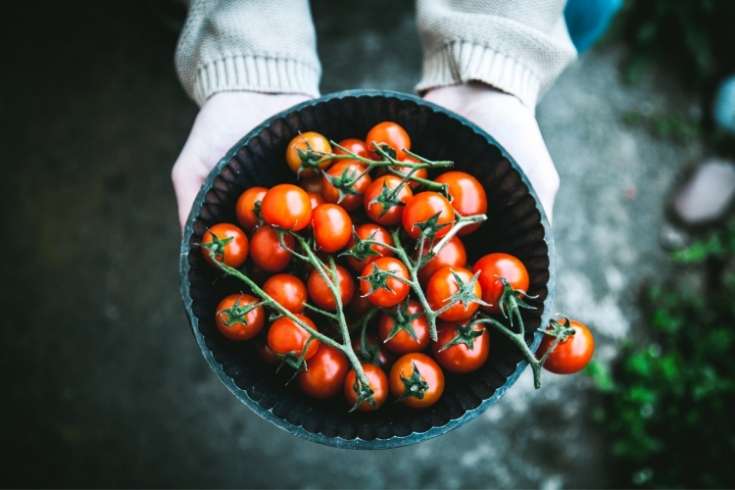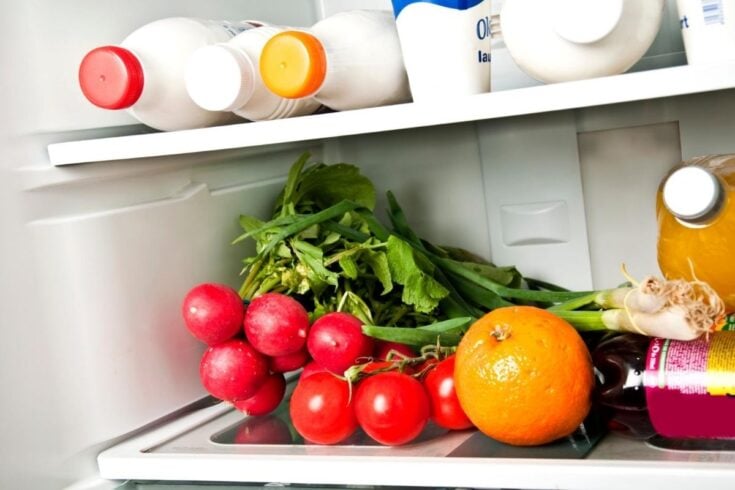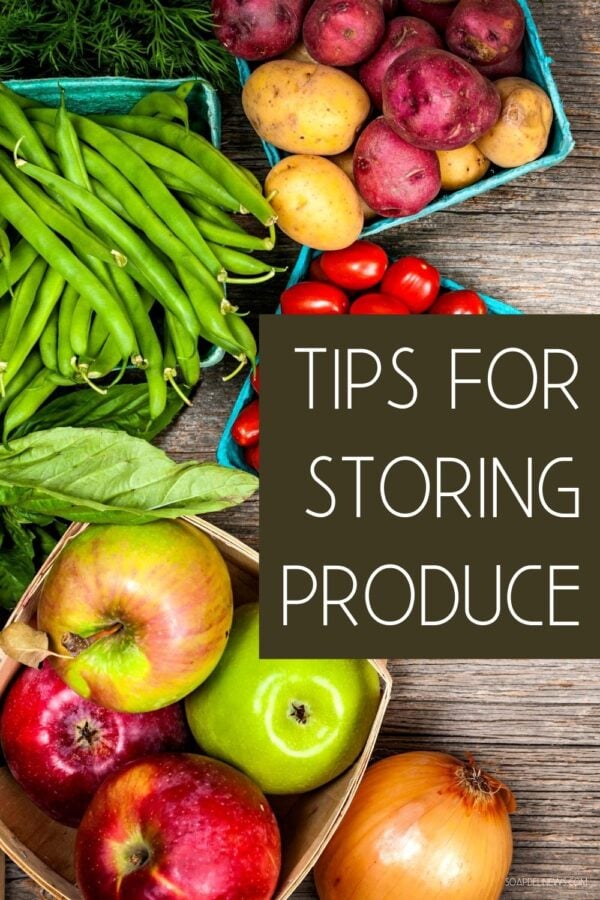
How Long Does Produce Last? Plus How to Use Ripe Produce to Make Soap
Wondering how long does produce last? Check out these handy tips and tricks for storing fresh fruits and veggies and learn how long your fresh produce will last with proper storage. Plus discover how to use overripe fruit and vegetables to make homemade cold process soap as a fun twist when produce becomes too ripe or soft to eat.
I try to eat healthy, which isn’t cheap. I only go to the store once every one or two weeks, so I have to plan my meals so I can stretch out my fresh fruits and vegetables. Learning about how long does fresh produce last helps me plan my meals so I can enjoy a variety of foods without much waste.
When I was younger, my parents had a garden. I remember how hard we worked to grow our food, so we definitely didn’t want to waste any! This year, gardening got more popular, and I expect that it will be popular again for several more years. While I don’t have a garden this year, I am getting a lot of leftover produce from neighbors who do have gardens as well. So storing produce properly so it gets used before it goes bad is a must.
After all of the hard work of gardening, whether it’s yours or someone else’s, you don’t want to waste any food. And you especially don’t want to throw money away by throwing out produce you may have purchased at the grocery store. Use this guide to help you determine how long you can keep fresh fruits and vegetables to reduce waste.

How Long Does Produce Last?
Part of eating healthy means eating fresh produce. However, some planning is necessary to ensure that fresh produce lasts until your ready to eat it. So just how long does produce last? Here’s a handy list on how long fresh produce lasts, plus tips on how to best store your seasonal fruits and vegetables, along with ideas for homemade soap recipes made with seasonal produce.
Apples
Apples can be stored in the fridge from 4 to 8 weeks. If apples have a few brown spots, you can cut them away and eat the apple. However, if it’s mushy or wrinkled, compost them.
You can spice up your apples for consumption by making this tasty caramel apples recipe. Otherwise, if apples get mushy before you are able to eat them, you can dehydrate the apples, then powder them. The powder can then be used to make an apple soap recipe.
Avocado
Avocados last from 4 to 7 days on the counter. To see if an avocado is ripe, peel off the stem. If it’s green, then it is ripe. Ripe avocados also have some give when you apply light pressure. Store cut avocados with a cut onion. The onion flavor won’t transfer to the avocado, but it will help the avocado last longer.
If you have ripe avocados that you aren’t going to eat, you can also use them to make an avocado soap recipe.
Bananas
Bananas should be stored on the counter for about 2 to 5 days. They are best when they are yellow with just a few brown spots.
If you have really ripe bananas that are too mushy to eat, you can use them in this banana soap recipe.
Blueberries
Store blueberries in the refrigerator for 1 to 2 weeks. They have a bluish gray color when ripe. If they look wet or have white spots, toss the entire pack.
You can also use up your blueberries to make this blueberry and carrot soap recipe. Likewise, raspberries or other berries may be used to make cold process soap as well. This raspberry soap recipe is another good one to try.

Broccoli
Broccoli should last about 1 to 2 weeks in the fridge. It should have a rich green color. The stems should be firm. If they are limp, it’s time to compost.
Carrots
Carrots have a long life of up to a month in the fridge. If they are limp or have white on the surface, they are no longer safe to eat. Cut the greens off before storing so they last longer.
Cucumbers
Cucumbers will last about a week in the fridge. It should have an even green hue. If it has dimples, turns yellow, or looks wrinkled, toss it.
If you aren’t able to eat your cucumbers before they bad, you can easily extend the shelf life of your cucumbers by making homemade refrigerator dill pickles.
Garlic
Garlic lasts from 3 to 6 months at room temperature. It should be off white and feel firm. You can cut off small sprouts before cooking. If it has turned yellow or wrinkled, it’s no longer safe to eat.
Lettuce
Lettuce lasts about 7 to 10 days in the fridge. It should be crisp. If it is soggy, has a foul odor, or the color has changed, do not eat it.
Onions
Onions have a long life of up to 3 months at room temperature. They should feel firm. If they have soft spots, they are no longer good.
Oranges
Store oranges in the fridge for up to a month. They should have a bright orange color and feel firm when you gently squeeze them.
Peaches
Peaches have a short life of only one to three days on the counter. They should have a deep color and wrinkle slightly. They should have some give when squeezed.
Peaches, and similarly pears, can also be used to make cold process soap recipes. This pear soap recipe is a great example of using ripe fruit in soap to craft unique homemade gifts.

Potatoes
Potatoes should be stored in the pantry or out of direct light up to 5 weeks. They should smell earthy and feel firm. If there are small sprouts, cut them out before using.
Strawberries
Strawberries last up to a week in the fridge. They should have a strong fragrance and be brightly colored. If there are any visible mold or white spots, toss the whole pack. Soak strawberries in 1 cup white vinegar and 3 cups of water for 10 minutes. Drain well and store in the container you bought them in so they can get some air.
String Beans
Beans will last 3 to 5 days in the fridge. They should be firm. If they are limp or wet, discard them.
Tomatoes
Tomatoes last for about a week on the counter. They should be firm and feel heavy.
If you end up with overripe tomatoes that are just too soft and watery to slice, you don’t have to resort to canning or spaghetti sauce. You can turn use your ripe tomatoes in this tomato soap recipe instead to upgrade your natural skin care routine.
Watermelon
Watermelon lasts about a week to 10 days in the refrigerator. They should sound hollow when you tape the side. It should feel firm when pressed but not solid.
Dehydrated and powdered watermelon is also perfect for making a cold process watermelon soap recipe.
Mushrooms
Whole mushrooms last a week to 10 days in the fridge. If it feels wet or sticky, they are no longer safe to eat. Store them whole for a longer shelf life. Store mushrooms in a paper bag because the bag will absorb moisture and help the mushrooms last longer.
Zucchini
Zucchini lasts up to 5 days in the fridge. It should be firm with a little bit of give when you squeeze it. It should be glossy and green.
If you need recipe ideas for using up your extra zucchini, give this flank steak tacos recipe with avocado crema a try. You can also use both summer and winter squash, such as pumpkins, to make a pumpkin soap recipe. Simply puree your squash or pumpkins before adding them to the recipe.

How Long Does Produce Last? Printable
If you need a handy reminder on how long produce lasts, then download and print my “How Long Does Produce Last?” printable here. Simply open the PDF file and print onto cardstock. Then frame and hang on your kitchen wall or pin it to your refrigerator with a magnet.

Storage Containers for Fresh Produce
I use reusable food storage bags for my fresh produce. You can use these on the counter or in the fridge, and I get a few extra days before the food goes bad. You can wash them and reuse them a few times.
I also like the Rubbermaid FreshWorks to store fresh produce in the fridge. They have a draining tray to keep food dry, and the vent helps regulate oxygen and carbon dioxide levels so food lasts longer. I’ve found that these don’t work well for food on the counter, so I use the bags for those foods.
How to Preserve Ripe Food
When I see that my fresh fruits and vegetables are getting ripe and I won’t be able to use them, I look for ways to preserve them. I usually freeze them for later.
I keep a bag in my freeze for onions, celery and garlic. When they are ripe and I know I won’t use them, I freeze them to make broth later.
I wash and cut fresh fruits and berries and keep them in their own bag. Use them to make smoothies or even a mixed fruit or berry dessert later. Freeze ripe bananas for smoothies or to make banana bread.
In addition, you can also dehydrate ripe fruit in a food dehydrator to make fruit and vegetable powders. The powdered produce keeps longer than fresh produce and can be incorporated into both natural skin care recipes and homemade soap recipes. (Be sure to check out my cold process food soap recipes below.)

How to Compost Food and Bad Produce
Even with the best of intentions, some fresh produce will still spoil before you can eat it. Since it can attract annoying fruit flies, it’s imperative that you take care of it quickly. I use a countertop compost bucket and empty it every couple of days.
This stainless steel countertop compost bucket is small, so it doesn’t take up a lot of counter space in your kitchen. It has a lid with a charcoal filter to reduce odors. Every few days, take it outside and dump it to compost the food.

It’s easy to clean, but to make it even easier you can get compostable bags. Just remove the bag, and toss it in your compost pile. Sometimes the bags leak and I have to wash the bucket, but generally they work very well and make composting a breeze.

Use Overripe Produce to Make Soap When Produce Doesn’t Last
It’s unfortunate that we end up with food waste. However, if your overripe produce or garden vegetables haven’t spoiled, they’re just too soft for consumption, you can use them to make cold process soap rather than tossing them into your compost bin. While using fresh fruits and vegetables is a bad idea when making melt and pour soap recipes, the saponification process soap undergoes when making cold process soap preserves any food ingredients you may use to make soap.
Cold Process Food Soap Recipes Made Using Fruits & Vegetables
Following is a list of all my homemade soap recipes that use fruits, vegetables and other foods for when your produce doesn’t last. In addition to using ripe fruits and vegetables, you can also dehydrate and powder your produce to incorporate it into your homemade soaps that way as well.
- Berry Banana Smoothie Soap Recipe
- Yogurt & Banana Soap Recipe
- Banana Oatmeal Soap Recipe
- Homemade Green Apple Donut Soap Recipe
- Yogurt & Avocado Soap Recipe
- Natural Pear Soap Recipe
- Natural Blueberry & Carrot Soap Recipe
- Natural Tomato Soap Recipe
- Natural Pear Soap Recipe with Real Pear
- Watermelon Soap Recipe
- Cold Process Apple Soap Recipe
- Cold Process Raspberry Soap Recipe
Have you ever used fruits or vegetables to make soap? I’d love to see your homemade soaps and other natural skin care products! Simply use the hashtag #soapdelishowoff on your Instagram posts so I can see what you came up with.
For more great posts from Soap Deli News, make sure to follow me across all your favorite social media platforms. You can find me on facebook, twitter and instagram as well as Pinterest.



1 Comments
Christie
August 7, 2020 at 5:06 pm
This is great! I love reading the life span of each produce type! Such handy information.
Comments are closed.